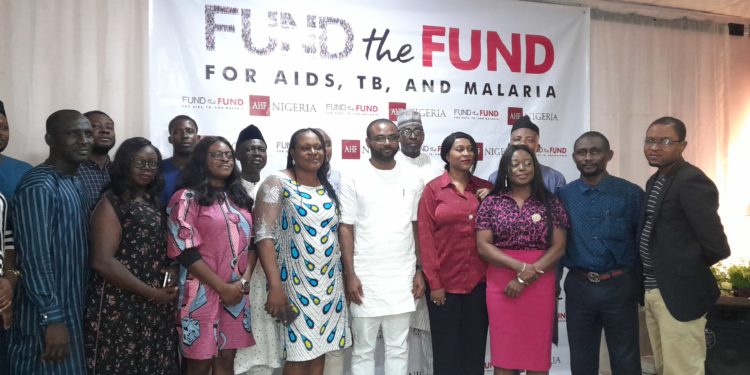Ahead of the 7th Global Fund Replenishment Conference in the United States, the AIDS Healthcare Foundation (AHF) has tasked world leaders, media and civil society organisations (CSOs), to step up advocacy for increased funding to tackle the scourge of tuberculosis (TB), Malaria and HIV/AIDS across the world.
At a roundtable interaction with stakeholders in Abuja on Wednesday, with the theme, ‘Fund the Fund for AIDS, TB and Malaria’, Director of Advocacy, Policy and Marketing of AHF, Kemi Gbadamosi, said that the $18 billion stipulated by Global Fund was not enough as over $28 billion
will be required to save over 20 million lives from HIV, TB and Malaria epidemic worldwide.
She said: “We want to ensure that no child dies of malaria, that people no long die from HIV/AIDS related complications and that is only possible if the funding comes. We always say that Global Fund has the best funding mechanism. It works around transparency, accountability and works with countries to trace and treat these diseases to ensure that when you put this fund, it will trickle down to the communities and more people will benefit.
“This is why AHF is throwing its weight behind this advocacy. We are not only doing this in Nigeria but across the 13 countries the advocacy has been going on, including G-7 and G-20 countries.
“We have been speaking with representatives from various countries on why they must amplify the advocacy to get the funding. It is our hope that with this advocacy, on September 19, when more countries can make more pledge to the global funding, we will be able to reach the 18 billion dollars and more.
“The role of CSOs in the global finding cannot be overemphaised. Just recently, Japan announced its contribution of over $1bn, which is a significant increase from their last replenishment. Part of the reasons that happened was because of civil society actions. As I speak with you today, a lot of mobilization is going on behind the scene from CSOs across the world.
“Basically, we are targeting governments to say you need to fight for what counts. Put your money where your mouth is. We saw how advocacy attracted response in HIV treatment. Advocacy is centre in TB, HIV and malaria. Beyond just asking government to give to Global Fund, CSOs are also key in ensuring that our resource mobilization succeeds.
“Part of what works in terms of advocacy is to be able to see impact on ground. When we talk about the 20 million lives that we want to save, that the global fund wants to save or the 30 million lives that have been saved in the past, there are people beyond these numbers.
“Global Fund is gathering signatures from different countries. We are calling on the Norwegian government to at least give 30% to the Global Fund. CSOs should also hold government accountable not just in terms of giving the money but also how the money is used,” she added.
The Executive Secretary, Country Coordinating Mechanism for the Global Fund-Nigeria, Dozie Ezechukwu, in his address stressed the need for more investment in the health sector by state governments.
According to him, “We need to ensure investment in health and then ensure that these investments are safeguarded and used properly to serve the people they are supposed to serve, so that when we come back in three or five years time, we don’t need to spend additional money on the same issue. We will then spend money on other areas needing attention. Spending money over and over again on the same issue is not progressive. So, we need to demonstrate that commitment and seriousness.
“I want to commend some state governments. I have been receiving calls from state governments, with regards to their counterpart funding. Some have actually set aside that money for health funding.
“The Minister of Health has also engaged them through the Nigerian Governors Forum and they made commitment that they will work with us, that they will sign a memo and ensure that they provide ongoing support to safeguard them. It is for the people to be honest. I think it is in our best interest to make use of it. The Global Fund support is not going to be there forever. So, let’s take advantage of what we have now and make sure it is opmitised to the benefit of our people.”
Present at the event were the Executive Director, Nigeria Network of Religious Leaders Living with or personally affected by HIV/AIDS (NINERELA), Amber Itohan Erinmwinhe, Executive Director, Creative Media Centre for Development, Jonah Akufai, National Secretary, Alliance on Surviving COVID-19 and Beyond (ASCAB), Atambi Ade Ade, Chairperson, Drug Harm Reduction Advocacy Network Nigeria, Aniedi Emeh Akpan, National Admin and Procurement, Network of People Living with HIV/AIDS in Nigeria (NEPWHAN), among others.



